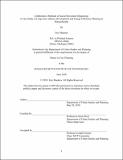| dc.contributor.advisor | Lorlene Hoyt. | en_US |
| dc.contributor.author | Mackres, Eric Benjamin | en_US |
| dc.contributor.other | Massachusetts Institute of Technology. Dept. of Urban Studies and Planning. | en_US |
| dc.coverage.spatial | n-us-ma | en_US |
| dc.date.accessioned | 2010-10-29T13:55:16Z | |
| dc.date.available | 2010-10-29T13:55:16Z | |
| dc.date.copyright | 2010 | en_US |
| dc.date.issued | 2010 | en_US |
| dc.identifier.uri | http://hdl.handle.net/1721.1/59577 | |
| dc.description | Thesis (M.C.P.)--Massachusetts Institute of Technology, Dept. of Urban Studies and Planning, 2010. | en_US |
| dc.description | This electronic version was submitted by the student author. The certified thesis is available in the Institute Archives and Special Collections. | en_US |
| dc.description | Cataloged from student submitted PDF version of thesis. | en_US |
| dc.description | Includes bibliographical references (p. 80-81). | en_US |
| dc.description.abstract | Some social movement organizations have begun to use collaborative methods to create decentralized network power for shared action through long-term alliance development and participation in collaborative public decision-making forums. Through the history of Community Labor United (CLU), a Boston-based long-term community-labor alliance, I establish the existence of mutual benefits between organizing and collaborative methods for creating solutions to complex problems. The prerequisites for the application of collaborative methods--diversity of interests, interdependence of interests, and authentic dialogue (DIAD)--are used to describe CLU's application of collaborative methods to the development of their alliance and their participation in statewide energy efficiency planning and implementation. I conclude by providing recommendations for the co-application of social movement organizing and collaborative planning practices to energy efficiency planning and complex public policy issues more generally. | en_US |
| dc.description.statementofresponsibility | by Eric Mackres. | en_US |
| dc.format.extent | 81 p. | en_US |
| dc.language.iso | eng | en_US |
| dc.publisher | Massachusetts Institute of Technology | en_US |
| dc.rights | M.I.T. theses are protected by
copyright. They may be viewed from this source for any purpose, but
reproduction or distribution in any format is prohibited without written
permission. See provided URL for inquiries about permission. | en_US |
| dc.rights.uri | http://dspace.mit.edu/handle/1721.1/7582 | en_US |
| dc.subject | Urban Studies and Planning. | en_US |
| dc.title | Collaborative methods in social movement organizing : a case study of long-term alliance development and energy efficiency planning in Massachusetts | en_US |
| dc.title.alternative | Case study of long-term alliance development and energy efficiency planning in Massachusetts | en_US |
| dc.title.alternative | Long-term alliance development and energy efficiency planning in Massachusetts | en_US |
| dc.type | Thesis | en_US |
| dc.description.degree | M.C.P. | en_US |
| dc.contributor.department | Massachusetts Institute of Technology. Department of Urban Studies and Planning | |
| dc.identifier.oclc | 670433161 | en_US |

